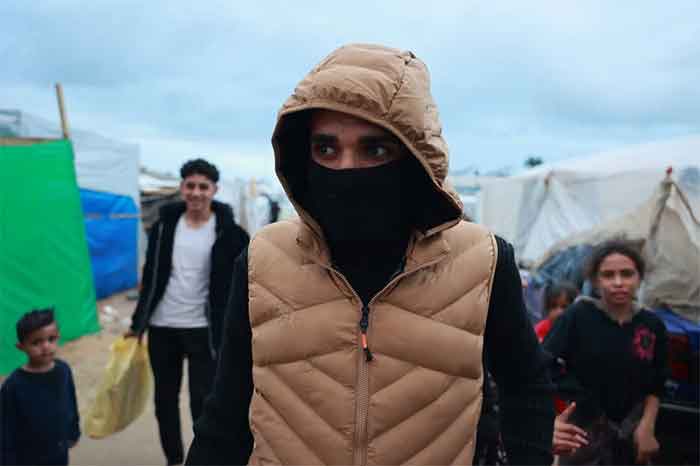
Rains and winds have intensified throughout the Gaza Strip since 17 November. Palestinians are facing the onset of winter without proper clothing, shelter and blankets.
The sense of fear is palpable.
Despite the truce, Palestinians in Gaza cannot return to homes that no longer exist or retrieve belongings that have been incinerated.
The displaced continue to overcrowd shelters. Not just in schools, but in any enclosed space in southern Gaza: shops, office buildings and warehouses.
As winter approaches, displaced Palestinians in Gaza are desperate for shelter from the cold.
Iman al-Najjar, 39, was shocked by the heavy rains that fell on 19 November.
She has been sheltering with her husband, mother-in-law and three children in Rafah’s Tel Sultan neighborhood, at the Rafah Girls School, which is run by the UN agency for Palestine refugees (UNRWA).
After a few hours of rain, the roof of the tent sank, and water poured into their tent.
Four other families faced the same flooding. They all went inside the school, to a back hallway.
She had no change of clothes for her and her three children.
The al-Najjar family was displaced from Gaza City’s Tel al-Hawa neighborhood on 25 October, after Israeli shelling of the area intensified. The family left the home with barely any belongings and did not know where they would go.
They walked on foot for 10 kilometers toward Rafah, until a truck picked them up.
Now, at the school in Rafah, she waited hours for the inside of the tent to dry.
“The cold is still intensifying every night inside the tent,” she said. “I sat down and looked at my kids and cried, we have no bedding and no clothes.”
She said that every night they have a “family circle,” and “every family puts their children in so that they get a little warmth.”
“Every morning the children cry from the cold,” she said. “My child Adam [5 years old] has had diarrhea for two days because of the water shortage and the cold.”
Ten members of the al-Najjar family, including Iman’s mother and four siblings, were killed in Israeli attacks.
“I cannot grieve or think when facing such cold,” she said. “We are now staying inside the UNRWA school and waiting for the management of the shelter center to find a place for us.”
“All of us are cold”
Ahmed Soboh, 50, is sheltering at the same school as the al-Najjar family. He was displaced along with his family three weeks ago from Jabaliya refugee camp in the northern Gaza Strip.
His tent has collapsed twice due to high winds over the past couple of days.
He has six children and seven grandchildren, all of whom are in dire need of winter clothing, especially since their current clothing is torn.
“I don’t have any socks, and even the sandals that don’t protect me from the cold are worn out,” he said. “All of us are cold.”
They fill bottles with rainwater to drink, but they are still thirsty.
Trying to meet basic needs
More than 1 million displaced Palestinians are sheltering in 156 UNRWA facilities in the Gaza Strip.
The Soboh family, like so many other families who were forcibly displaced by Israeli attacks, did not even consider that they would be away from their homes for so long. Therefore they did not pack essential belongings or clothing for winter.
Bilal Atwa, 35, did not even have time to pack clothing for his three children when his family evacuated. They left their home after their neighbor’s house was bombed.
Atwa and his family are currently sheltering in an empty shop in Khan Younis with 35 other individuals. They were forcibly displaced by Israeli attacks on Gaza City’s al-Karama neighborhood on 1 November.
When the temperatures began to drop, families searched for additional clothing to keep warm. But merchants who sell used clothing have told them that there is a shortage.
It is difficult to sleep due to the cold, Atwa said.
“I hold my children’s hands every day until I give them a little warmth, or I massage them a little so they feel warm.”
“For the first time,” he said, “my child is saying she is scared even though she is with me.”
Atwa only wants to meet his children’s basic needs and to protect them from hunger and the cold.
Amjad Ayman Yaghi is a journalist based in Gaza.
Originally published in Electronic Intifada










































